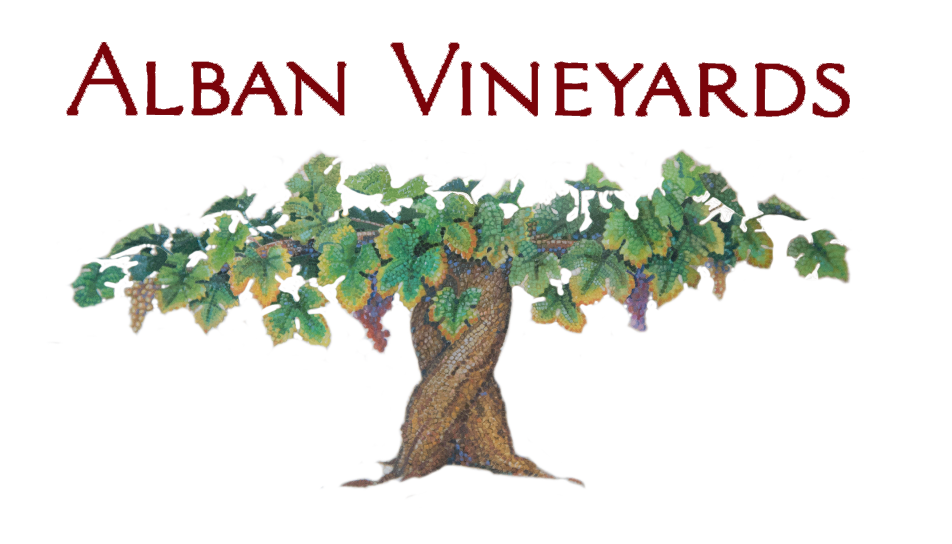Our Farming
Photo credit: Rosenthal Photography
Of all the tabs you could have selected, this one is by far the most elaborate and involved. It is in fact our FARMING that makes us, and our wines, what we/they are. To do this topic justice I am simultaneously going to violate one of my fundamental ‘precepts’: I am actually going to tell you why we don’t do certain things as well. I generally eschew this sort of negative missive as I genuinely believe that the world is a better place when we put our efforts into lauding what we feel good about and simply ignoring the rest. We are not certified orgANIC, or biodynAMIC, but are in fact 100% alBANIC.
I must admit my complete befuddlement over the concept of having a third party certify one’s vineyard as anything. This personal confusion probably stems from my fundamental belief in two inviolable principles:
1. Anyone who grows food has a tremendous responsibility to assure their produce safe.
2. Wineries are born over decades so you better give some serious thought to sustainability.
Photo credit: Rosenthal Photography
So what on earth would the ‘certification’ be? We’ve ruled out safe and sustainable as those are prerequisites. If it is meant to be a seal of approval, I find that unwarranted with wine: you will all taste and evaluate the results. Your certification is the only one that matters. Beyond these two laws there is absolutely no dogma to the way we farm, except our dogmatic pursuit of a single goal- the production of the very best wines we feel our little piece of dirt can foster.
By definition, to be ALBANIC, the vineyard must be farmed safely, and sustainably, with the only goal being the best wines we feel our plot of land can yield. Where our soils become particularly unique, we isolate those blocks and make named wines that we feel are sufficiently distinct to recognize as more than mere expressions of a grape variety. It is the different soil types that each emerges from that gives them this character. Our entire farming philosophy is founded upon doing our utmost to maintain all that is special about these blocks. We don’t want to add water or fertilizer or anything else we can avoid so as to maximize the attributes that make these vineyards different. Vines without water or fertilizer don’t get very large or yield much ripe fruit. We want ripe fruit because we firmly believe there is a reason the expression ‘sour grapes’ has persisted in the lexicon for centuries; therefore we are ‘stuck’ with low yields.
We also must deal with the weeds that would engulf these already dwarfed vines and the many insects that can get out of hand if unaddressed. Since herbicides and insecticides would also represent foreign additives, we need employees that can remove these ‘pests’ without leaving any non-native residue. We were one of the first vineyards in the world to maintain its own flock of sheep year round and exclusively for the purpose of vineyard management. The sheep graze down everything and simultaneously compost what they eat. Since our sheep are not given supplemental feed, they do not add anything ‘new’ to our soils; they just keep cycling through and composting the nutrients that are already here. Unlike a mowed field, the eggs and insects on the grazed plants are destroyed. The sheep are in the vineyards from soon after harvest to bud break. They actually return to our fields for a month preceding veraison (the stage where red grapes develop color and white grapes soften). As long as the grapes aren’t soft or red, the sheep won’t touch them; I wouldn’t either.
While we could do all the mowing with tractors it wouldn’t control insects or completely and uniformly compost what is already here. The cut weeds and decaying leaves beneath the vines harbor the pests we would otherwise have to spray. When the sheep forage this material, their digestive tract destroys all the bad bugs, larvae, and eggs.
There is no formula for our farming beyond the fundamental philosophy of making the best wines possible and protecting the unique properties of our vineyard. I never imagined that one day we would basically turn much of the vineyard management over to creatures.
Meet El Diablo, and watch El Diablo in action:
At the other extreme, we are very much looking at and forward to using drones and robots to help as well.We rigged this programmable drone with speakers and an MP3 player. He flies our vineyards in very precise patterns on auto-pilot blaring native predatory bird calls. While we engineered El Diablo to chase away the birds that cause us problems, we didn’t anticipate the extent to which real hawks are drawn to his calls. These genuine predators further deter the birds that would like to eat our grapes. El Diablo does the work of 3 employees on ATV’s without burning fuel, compacting the soil, creating dust or making sound audible beyond our fence lines.
I would also point out that no matter how crazy an idea may seem, if it is worthwhile it will soon be emulated. Winemaking is a continuum. Just as we have built on concepts that date back centuries, we have sincerely enjoyed watching our innovations proliferate. If there is an age old technique that works, we use it. If we discover a new and, in our application, better technology, we’ll use that too. We want our tradition to be: delicious.




